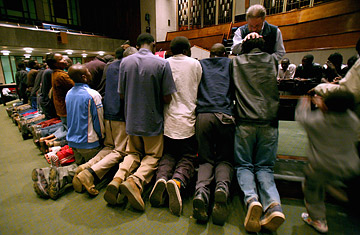
Bishop Paul Verryn (top right) blesses Zimbabwean immigrants at a church in Johannesburg July 26, 2007.
Saturday was different, and when the cops came, Bishop Paul Verryn was pleased to see them. For years, the arrival of the South African police at his doorstep had brought violence and fear — back during the 1980s, when he had been a leading anti-apartheid cleric, and even as recently as last January, when the force had raided his Central Methodist Church in downtown Johannesburg, wielding guns and clubs, kicking down doors and beating the terrified people sheltering behind them. "The violence and abusiveness of the raid was just the same as in the '80s," recalls Verryn, although this time the target had been illegal immigrants from Zimbabwe who had sought refuge here from the violence and brutality of their troubled homeland. On Saturday, however, the police arrived in the nick of time to prevent a bloodthirsty mob from attacking the more than 3,000 terrified immigrants cowering inside. The xenophobic violence that has shaken South Africa over the past week has changed the equation, and forced the country to confront some ugly truths.
Verryn has always put himself on the line to protect the poor, the weak and the persecuted. In the 1980s, he sheltered victims of apartheid violence — and even found himself libeled by Winnie Madikizela-Mandela in 1988 when a gang of toughs she kept as a personal bodyguard abducted child activist Stompie Sepei from his Methodist manse and later murdered the boy. In the intervening years, he has dedicated himself to ensuring that South Africa's liberation brought relief to the country's rampant poverty.
Verryn has been deeply saddened by the government's lack of responsiveness to the needs of the poor. "I think Parliamentarians should be carried out of the Parliament and forced to sit in the dusty townships and take account of what is happening," he says, "and feel the extreme desolation of the people they are governing." That desolation, over the past two weeks, has spawned a violent rage directed at vulnerable immigrants. "Here you have this paragon of reconciliation crumbling to anarchy," he says of his country. "We've lost our innocence at the very least. The question now is whether we are losing our humanity."
The recent wave of attacks perpetrated by poor black South Africans against African immigrants implicates not only the immediate perpetrators, he says, but also the government and the police.
Thursday's announcement by South African intelligence officials that the anti-immigrant attacks had been deliberately orchestrated in pursuit of a political agenda did not surprise Verryn. His work with immigrants has long acquainted him with corrupt and incompetent officials who often extort bribes from illegal immigrants: "This thing is coordinated," he says, of the wave of violence. "It's difficult to say exactly who is behind it, but I believe that it is some within the police, some within the [opposition Zulu nationalist] Inkatha Freedom Party and other constituents. It's almost as if the violence is working on a timeline."
Still, he sees the violence as a reminder of the challenges that face South Africans in dealing with their own history of prejudice and violence: "We have struggled with gender, we have struggled with race, we have struggled with AIDS, we have struggled with crime, and now we are struggling with 'the other,' " he says.
"Zimbabweans are almost family to us," says Verryn. "Ninety to ninety-five percent of them are there because they are genuine political refugees. These are traumatized and vulnerable people."
Hundreds have arrived at his church bleeding from wounds, many with nothing more than the clothes on their backs. Today, the bishop spends his every waking hour ministering to their needs: securing food donations and jobs, fighting the notorious corruption and inefficiency of the immigration bureaucracy, and securing legal and medical help for the needy. Wiry and energetic, Verryn laughs easily, despite the tragedy of so much of what he describes. It is in the courage and compassion of the weak and vulnerable that he finds his inspiration.
Gaudencia Muchiruiku, 58, is one of the countless Zimbabweans helped by Verryn. An opposition political activist from Mutare, she arrived here destitute after her house was destroyed and she suffered a broken arm in a beating by the security forces of President Robert Mugabe. "Since I arrived I have struggled to get asylum," says Muchiruiku. "We have no chance to look for jobs, or even to walk through the roads. If the police find us without our papers, they ask us for money," she says, meaning a bribe against deportation. Verryn "goes to the government and gets legal help for us," she says, as the women around her agree with vehement shouts and cheers. "He is our mother, our father. He should become our president."
Refugees and their belongings are crammed into every corner of the five-story building. Children and the sick sleep on mattresses and blankets in hallways, and the toilets are overflowing. Tensions often simmer among families crammed tightly into the crumbling building that has become a virtual prison. But Verryn sees his work here as a privilege.
As mobs tried to force their way into the building last Saturday, terrified refugees ran to the top floor, desperately searching for sticks and pipes with which to defend themselves — even breaking apart the communion rail in the chapel. Later, once the police had arrived and the situation calmed, residents came to lay their makeshift weapons on the altar as a symbolic gesture of their resolve to avoid meeting violence with violence. "It is an honor," Verryn says of his work with the migrants. "They have a profound commitment to sustaining the dignity of their families. They are not afraid of selling newspapers, or cleaning floors. They will do whatever it takes to educate their children. These are the kind of people you want to build a nation for."
